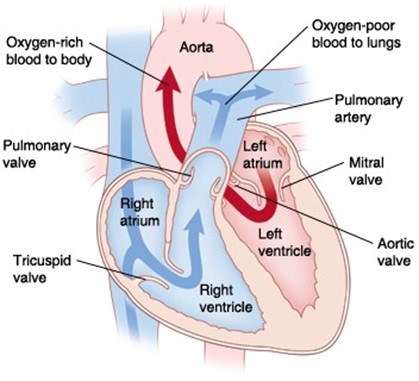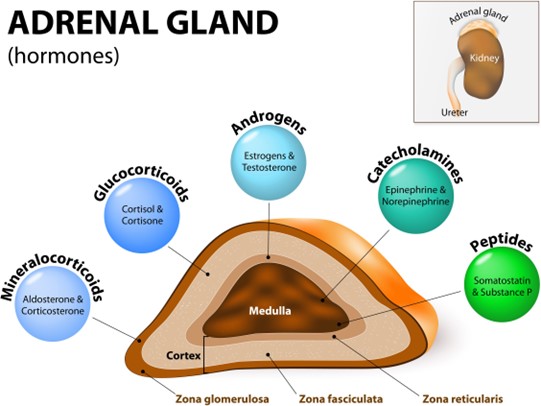Which of the following is the correct sequence of parts through which blood moves from the vena cava to the lungs?
Right atrium, tricuspid valve, right ventricle, pulmonary valve.
Right ventricle, pulmonary valve, right atrium, tricuspid valve.
Right atrium, pulmonary valve, right ventricle, tricuspid valve.
Right ventricle, tricuspid valve, right atrium, pulmonary valve.
The Correct Answer is A

This is the correct sequence of parts through which blood moves from the vena cava to the lungs.
Choice B is wrong because it reverses the order of the right atrium and right ventricle. Blood flows from the right atrium to the right ventricle, not the other way around.
Choice C is wrong because it switches the positions of the tricuspid valve and the pulmonary valve.
Blood flows from the right atrium through the tricuspid valve to the right ventricle, and then through the pulmonary valve to the pulmonary artery.
Choice D is wrong because it also switches the positions of the tricuspid valve and the pulmonary valve, and reverses the order of the right atrium and right ventricle.
Blood flows from the right atrium through the tricuspid valve to the right ventricle, and then through the pulmonary valve to the pulmonary artery.
The normal range of blood pressure in the vena cava is about 0 to 5 mmHg, while in the pulmonary artery, it is about 15 to 25 mmHg.
The normal range of oxygen saturation in the vena cava is about 60% to 80%, while in the pulmonary vein, it is about 95% to 100%.
Nursing Test Bank
Naxlex Comprehensive Predictor Exams
Related Questions
Correct Answer is B
Explanation

Epinephrine, also known as adrenaline, is a hormone that the adrenal medulla secretes in response to stress or low blood sugar levels.
It helps the body react to stress by increasing blood pressure, heart rate, oxygen delivery to muscles, and blood sugar levels.
Choice A is wrong because mineralocorticoids are hormones that the adrenal cortex secretes, not the adrenal medulla.
They help regulate the balance of sodium and potassium in the body.
Choice C is wrong because glucocorticoids are also hormones that the adrenal cortex secretes, not the adrenal medulla.
They help control the body’s use of fats, proteins, and carbohydrates, suppress inflammation, and regulate blood pressure and blood sugar.
Choice D is wrong because aldosterone is a specific type of mineralocorticoid that the adrenal cortex secretes, not the adrenal medulla.
It helps regulate the balance of sodium and water in the body.
Correct Answer is A
Explanation
The correct answer is choice A. True.
Blood flow through a capillary is controlled by a precapillary sphincter, which opens or closes due to the requirements of the cells supplied by the capillary.
This allows blood to bypass the capillaries when they are not needed and to increase blood flow when they are needed.
Choice B. False is wrong because it contradicts the true statement in choice A. A precapillary sphincter is a ring of smooth muscle that surrounds the entrance of a capillary and regulates blood flow into it.
It is influenced by local factors such as oxygen, carbon dioxide, pH, and temperature.
Whether you are a student looking to ace your exams or a practicing nurse seeking to enhance your expertise , our nursing education contents will empower you with the confidence and competence to make a difference in the lives of patients and become a respected leader in the healthcare field.
Visit Naxlex, invest in your future and unlock endless possibilities with our unparalleled nursing education contents today
Report Wrong Answer on the Current Question
Do you disagree with the answer? If yes, what is your expected answer? Explain.
Kindly be descriptive with the issue you are facing.
